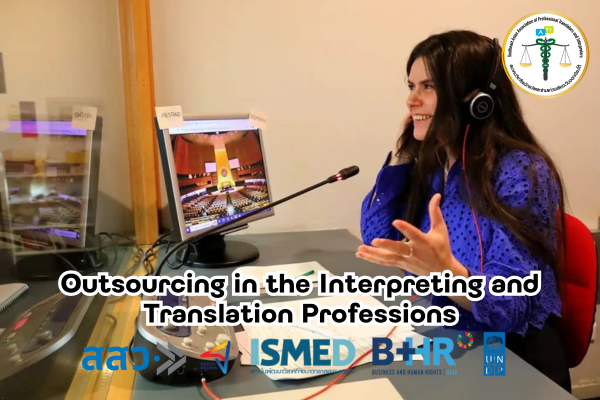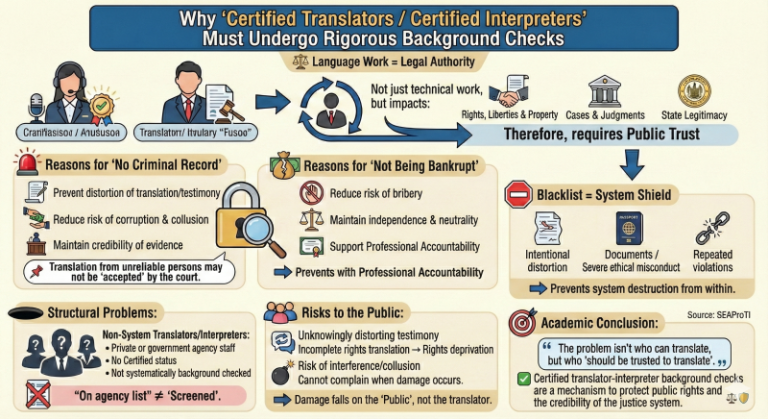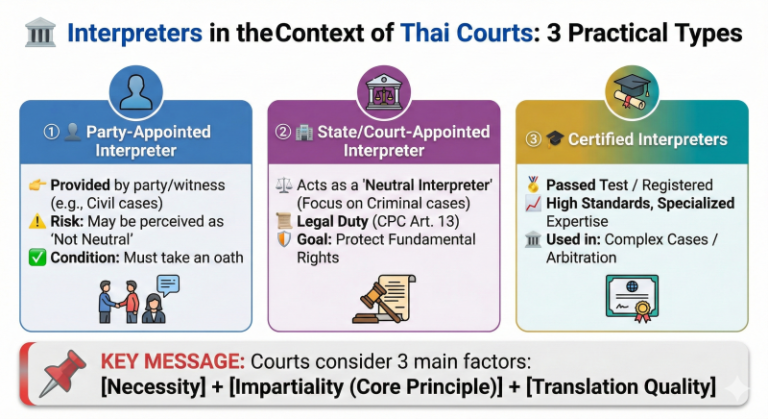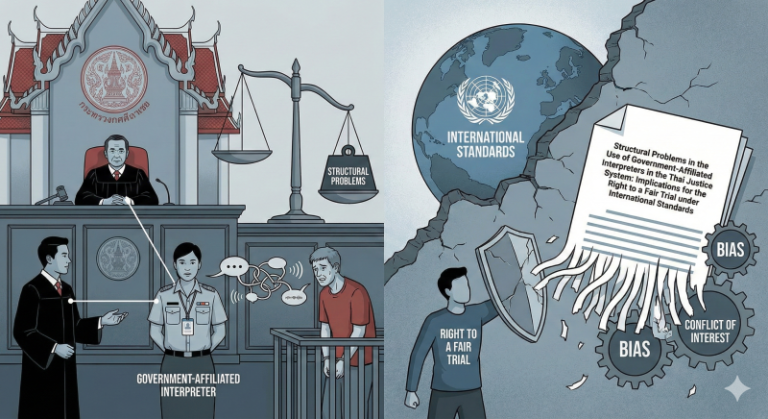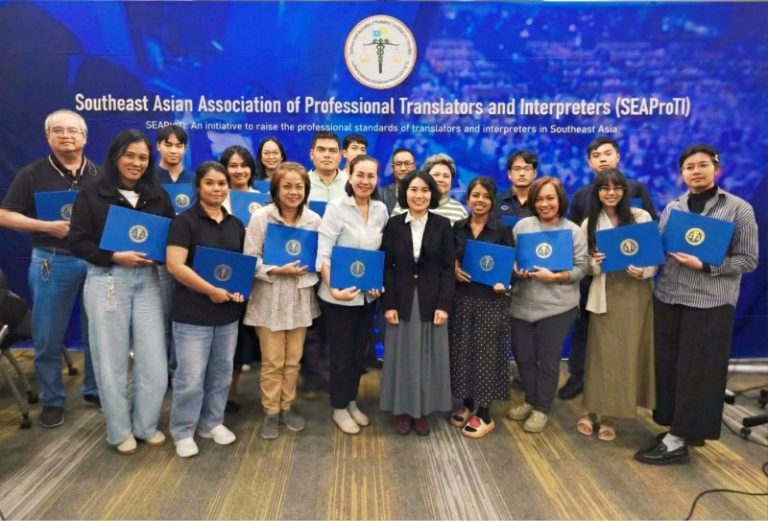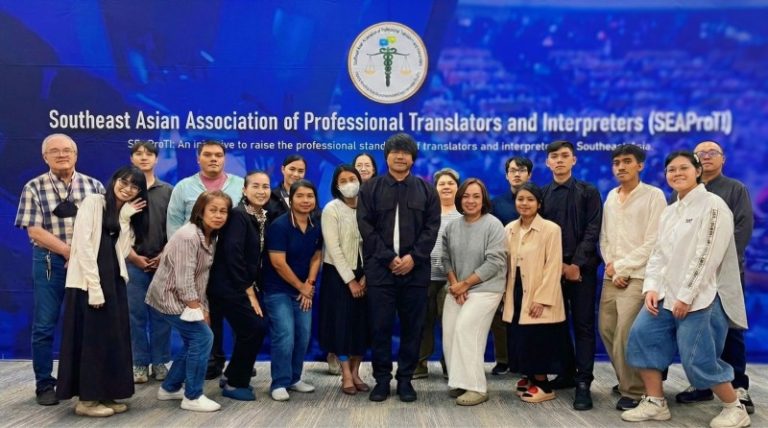Outsourcing in the Interpreting and Translation Professions:
Risks to Quality, Reputation, and Professional Credibility
31 May 2025, Bangkok – In the freelance interpreting and translation profession, responsibility for the quality of work does not end at delivery. It also extends to decisions about whether to accept or outsource a job. Trust, credibility, and professional reputation are key assets in this field. Thus, when one decides to pass on a job to another individual, that decision can carry significant implications—positive or negative—for long-term career sustainability.
This article explores the risks of outsourcing translation and interpreting assignments, particularly when the chosen subcontractor may not possess equal expertise. It underscores the importance of personal accountability in maintaining professional standards and proposes best practices to mitigate such risks at both the individual and organizational levels.
1. The Nature of High-Stakes Translation and Interpreting Work
Translation and interpreting are classified as knowledge-intensive services, requiring linguistic expertise, subject-matter knowledge, and deep cultural awareness. Certain assignments, due to their complexity and impact, should not be casually outsourced. These include:
- Court interpreting or arbitration interpreting
- Legal document translation, such as contracts or official filings
- Medical interpreting, particularly in high-stakes or emergencies
- Simultaneous or consecutive interpreting at high-level international events
Outsourcing these assignments to someone unfamiliar with the technical field or lacking sufficient experience can lead to serious consequences, such as legal misinterpretations, failed negotiations, or ethical breaches.
2. Risks to Professional Reputation and Credibility
When a freelancer chooses to subcontract a job, they assume direct responsibility for the final result in the client’s eyes. If the quality of the outsourced work is poor, the consequences often affect the original contact person, not the anonymous subcontractor behind the scenes.
Potential consequences include:
- Loss of trust from regular clients
- Exclusion from future projects or vendor lists
- Reputational damage through client or industry word-of-mouth
- Legal or ethical disputes related to contract breach or misrepresentation
In a profession that relies heavily on social capital and word-of-mouth referrals, even a single misstep can result in long-term damage to one’s professional standing.
3. Closed Networks and the Culture of Controlled Outsourcing
Field observation shows a clear pattern: interpreters and translators who consistently receive high-value, high-difficulty assignments tend to outsource only within a trusted inner circle—a group of professionals with proven reliability and shared quality standards.
This practice reflects the concept of closed professional networks, in contrast to open-market gig platforms. The reasons for this include:
- Reducing the risk of quality failure
- Ensuring consistent standards of delivery
- Maintaining mutual accountability among professionals
In such networks, trust is not assumed—it is earned through years of collaboration, proven competence, and shared responsibility.
4. Best Practices When Outsourcing Is Necessary
There are legitimate situations where outsourcing may be unavoidable, such as illness, schedule conflicts, or unforeseen personal emergencies. In such cases, the following best practices are recommended:
- Vet the subcontractor carefully: Check their portfolio, qualifications, and domain expertise.
- Be transparent with the client: If your name appears in the contract, request client approval before outsourcing.
- Review all work before final delivery: Require early submission from the subcontractor so you can review and ensure quality.
- Build your own trusted network: Establish a team or circle of professionals with whom you share expectations and accountability.
Conclusion
Outsourcing interpreting and translation work is not inherently unethical, but it demands careful judgment and proactive risk management. The stakes include your reputation, professional credit, and long-standing client trust, all of which take years to build and can be lost in a single mismanaged assignment.
The responsibility for quality remains with the one whose name is on the client agreement. In the eyes of the client, success or failure reflects on the professional they trusted, regardless of who performed the work behind the scenes.
SEAProTI’s certified translators, translation certification providers, and certified interpreters:
The Southeast Asian Association of Professional Translators and Interpreters (SEAProTI) has officially announced the criteria and qualifications for individuals to register as “Certified Translators,” “Translation Certification Providers,” and “Certified Interpreters” under the association’s regulations. These guidelines are detailed in Sections 9 and 10 of the Royal Thai Government Gazette, issued by the Secretariat of the Cabinet under the Office of the Prime Minister of the Kingdom of Thailand, dated July 25, 2024, Volume 141, Part 66 Ng, Page 100.
To read the full publication, visit: the Royal Thai Government Gazette
การส่งต่องานในวงการล่ามและนักแปล: ความเสี่ยงด้านคุณภาพ ชื่อเสียง และเครดิตในวิชาชีพ
31 พฤษภาคม 2568, กรุงเทพมหานคร – ในสายวิชาชีพล่ามและนักแปลอิสระ ความรับผิดชอบต่อคุณภาพของงานมิได้สิ้นสุดลงเมื่อส่งมอบผลงานแก่ลูกค้าเท่านั้น หากแต่ยังรวมถึงการตัดสินใจว่าจะรับงานหรือส่งต่องานให้ผู้อื่นด้วย ความน่าเชื่อถือ ความไว้วางใจ และชื่อเสียงทางวิชาชีพ ล้วนเป็นองค์ประกอบที่มีผลอย่างยิ่งต่อความยั่งยืนในอาชีพนี้
บทความนี้มีวัตถุประสงค์เพื่อวิเคราะห์ความเสี่ยงของการส่งต่องานแปลและล่ามให้บุคคลอื่น โดยเฉพาะกรณีที่ผู้รับงานอาจไม่มีความเชี่ยวชาญเท่ากันกับผู้ว่าจ้างงานเดิม ทั้งนี้เพื่อตอกย้ำความสำคัญของความรับผิดชอบระดับบุคคลในการรักษามาตรฐานวิชาชีพ และเพื่อเสนอแนวทางการบริหารความเสี่ยงดังกล่าวในระดับปัจเจกและองค์กร
1. ลักษณะของงานล่ามและงานแปลที่ไม่ควรถูกส่งต่อง่าย ๆ
ในทางทฤษฎี การแปลและการล่ามจัดอยู่ในกลุ่ม “งานใช้ความรู้เฉพาะทาง” (knowledge-intensive services) ซึ่งต้องอาศัยทั้งทักษะภาษา ความรู้ในสาขาเฉพาะทาง และความสามารถในการเข้าใจบริบททางสังคมและวัฒนธรรม ตัวอย่างของงานที่มักจะมีความซับซ้อน ได้แก่:
- งานล่ามศาล หรือล่ามในการไกล่เกลี่ยข้อพิพาท
- งานแปลเอกสารกฎหมาย สัญญา หรือเอกสารที่เกี่ยวข้องกับการยื่นราชการ
- ล่ามแพทย์ในกรณีฉุกเฉินหรือใช้ศัพท์แพทย์ขั้นสูง
- งานแปลการประชุมระดับภูมิภาค/นานาชาติ
การส่งต่องานประเภทนี้ให้กับผู้ที่ไม่มีความเชี่ยวชาญในสาขานั้น ๆ อาจทำให้เกิดความเสียหายด้านความเข้าใจ ความถูกต้องทางกฎหมาย หรือผลกระทบในเชิงจริยธรรมที่รุนแรง
2. ความเสี่ยงต่อชื่อเสียงและเครดิตของผู้ส่งงาน
ผู้ที่ตัดสินใจส่งต่องานให้ผู้อื่น (subcontracting) ย่อมมีความเสี่ยงโดยตรงหากงานที่ถูกส่งต่อมีคุณภาพต่ำ ไม่สามารถตอบโจทย์ลูกค้าได้ หรือผิดพลาดในสาระสำคัญ เพราะลูกค้ามักจะเชื่อมโยงความรับผิดชอบของผลงานนั้นกับ “ผู้ที่ติดต่อกับลูกค้าโดยตรง” มากกว่าผู้รับช่วงงานที่อยู่เบื้องหลัง
ผลกระทบที่อาจเกิดขึ้น ได้แก่:
- สูญเสียความเชื่อมั่นจากลูกค้าประจำ
- ถูกตัดออกจากรายชื่อผู้ว่าจ้างในอนาคต
- เสียเครดิตในวงการหากเกิดการพูดต่อในหมู่ลูกค้าและผู้ร่วมวิชาชีพ
- เกิดข้อพิพาททางสัญญาหรือโดนร้องเรียนในทางกฎหมาย/จริยธรรม
ในสายอาชีพที่อาศัย “ความเชื่อถือ” เป็นทุนทางสังคม (social capital) อย่างสูง ชื่อเสียงเพียงนิดเดียวที่เสียไปสามารถส่งผลระยะยาวต่อโอกาสทางอาชีพได้
3. เครือข่ายภายใน (Closed Networks) และวัฒนธรรมการส่งต่องาน
จากการศึกษาภาคสนามและประสบการณ์ในแวดวง พบว่ามีแนวโน้มชัดเจนว่าผู้ที่ได้รับงานแปลและล่ามที่มีมูลค่าสูงหรือความยากระดับมืออาชีพ มักจะส่งต่องานให้กับ “คนในกลุ่ม” หรือเครือข่ายที่เชื่อถือได้เท่านั้น กล่าวคือ มีการเลือกเฉพาะเพื่อนร่วมวิชาชีพที่เคยทำงานด้วยกัน มีมาตรฐานเดียวกัน และสามารถรับผิดชอบร่วมกันได้
ลักษณะนี้สะท้อนรูปแบบของ “เครือข่ายแบบปิด” (closed professional networks) ซึ่งต่างจากระบบการจ้างแบบเปิดทั่วไป โดยมีเป้าหมายเพื่อ:
- ลดความเสี่ยงด้านคุณภาพ
- รักษามาตรฐานงาน
- ป้องกันความเสียหายต่อชื่อเสียงส่วนตัวและกลุ่ม
4. แนวทางปฏิบัติที่ปลอดภัยเมื่อจำเป็นต้องส่งต่องาน
หากมีความจำเป็นต้องส่งต่องานจริง ๆ (เช่น ภาระงานทับซ้อน, ติดภารกิจเฉพาะหน้า, ปัญหาด้านสุขภาพ ฯลฯ) ควรพิจารณาแนวทางเหล่านี้:
- ตรวจสอบคุณสมบัติของผู้รับช่วงงาน: ดูผลงานเก่า วุฒิการศึกษา ความเชี่ยวชาญเฉพาะทาง
- แจ้งลูกค้าอย่างโปร่งใส: หากลูกค้าระบุชื่อคุณในสัญญา ควรขออนุญาตก่อนส่งต่องาน
- ควบคุมคุณภาพด้วยตนเอง: ขอให้ผู้รับงานส่งกลับมาก่อน deadline เพื่อคุณจะได้ตรวจสอบก่อนส่งลูกค้า
- สร้างระบบเครือข่ายของคุณเอง: เช่น ทีมล่ามหรือกลุ่มนักแปลที่ใช้มาตรฐานเดียวกัน
บทสรุป
การส่งต่องานล่ามและแปลไม่ใช่เรื่องผิดทางจริยธรรมหรือวิชาชีพ หากแต่เป็นเรื่องที่ต้องใช้ดุลยพินิจอย่างรอบคอบที่สุด เพราะเดิมพันนั้นคือเครดิต ชื่อเสียง และความไว้วางใจที่ต้องใช้เวลาสะสมในอาชีพอย่างยาวนาน ความรับผิดชอบต่อคุณภาพงานไม่ควรถูกมองว่า “จบ” เมื่องานถูกส่งไปยังบุคคลอื่น เพราะในสายตาของลูกค้า ผลลัพธ์สุดท้ายย่อมสะท้อนกลับมาสู่คนที่เขาไว้วางใจเสมอ
เกี่ยวกับนักแปลรับรอง ผู้รับรองการแปล และล่ามรับรองของสมาคมวิชาชีพนักแปลและล่ามแห่งเอเชียตะวันออกเฉียงใต้
สมาคมวิชาชีพนักแปลและล่ามแห่งเอเชียตะวันออกเฉียงใต้ (SEAProTI) ได้ประกาศหลักเกณฑ์และคุณสมบัติผู้ที่ขึ้นทะเบียนเป็น “นักแปลรับรอง (Certified Translators) และผู้รับรองการแปล (Translation Certification Providers) และล่ามรับรอง (Certified Interpreters)” ของสมาคม หมวดที่ 9 และหมวดที่ 10 ในราชกิจจานุเบกษา ของสำนักเลขาธิการคณะรัฐมนตรี ในสำนักนายกรัฐมนตรี แห่งราชอาณาจักรไทย ลงวันที่ 25 ก.ค. 2567 เล่มที่ 141 ตอนที่ 66 ง หน้า 100 อ่านฉบับเต็มได้ที่: นักแปลรับรอง ผู้รับรองการแปล และล่ามรับรอง


